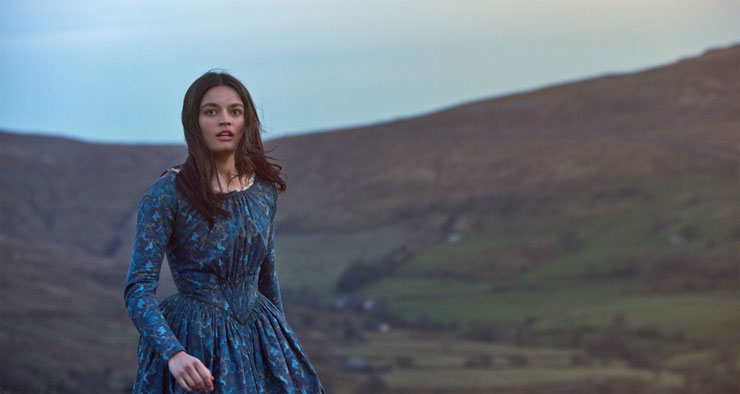
Emma Mackey in a scene from "Emily." (Photo courtesy of Bleecker Street)
Something that is always gratifying to find is a film that reinvents a particular genre or forces viewers to regard it in a different light. Such rare birds wipe the slate clean and forge their own path. They're unicorns, fated to be misinterpreted, derided and dismissed. As for the possibility of a second life, suffice it to say a reappraisal down the line is not guaranteed and in many cases is, sadly, not in the cards.
“Emily,” a bold and sprightly portrait of English author Emily Brontë and what inspired her to pen “Wuthering Heights,” is not such a game changer. It hits the expected period piece story beats with such clockwork precision that you can time the characters' actions with a stopwatch. But even as it embraces some thoroughly familiar tropes, the writing-directing debut of British-Australian actress Frances O'Connor rarely feels shopworn. It tosses out the genre's stuffy trappings as if it were holding a garage sale.
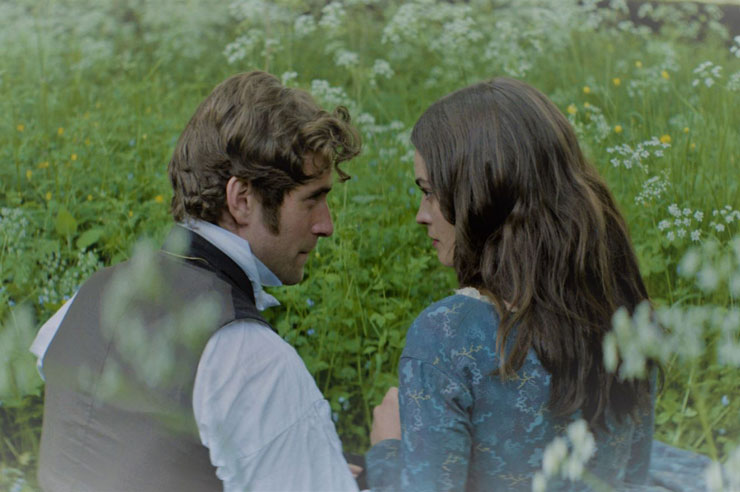
Oliver Jackson-Cohen and Emma Mackey in a scene from "Emily." (Photo courtesy of Bleecker Street)
What the filmmaker does hold on to feels raw and vital: long-standing resentments, unrequited longings, bruised egos, hearts that shatter into a million tiny fragments. It is a playground for tortured romantics, much like the novel that turned the Yorkshire resident into a renowned author in the mid-1800s.
O'Connor introduces viewers to her protagonist's life in quick, broad brushstrokes. The daughter of Irish Anglican priest Patrick Brontë, there's no doubt Emily (“Sex Education's” Emma Mackey, channeling Anne Hathaway) is the black sheep of her family. Patrick (Adrian Dunbar), a widower, sizes up his second-to-youngest daughter and all he sees is squandered potential. Emily sulks. She lingers behind and prefers the company of me, myself and I. As her siblings inform Emily, people in town call her “The Strange One” behind her back. The golden child in this household is eldest daughter Charlotte (Alexandra Dowling), who has a loving but adversarial relationship with Emily that O'Connor mines to maximum effect.
Patrick also has high hopes for his son Branwell (Fionn Whitehead), who has his own writing goals, but anyone familiar with the Brontë saga knows how that turns out. Rounding out the quartet of surviving Brontë children is baby sis Anne (Amelia Gething), a rare ray of sunshine amid the damp and gloomy northern England landscapes.
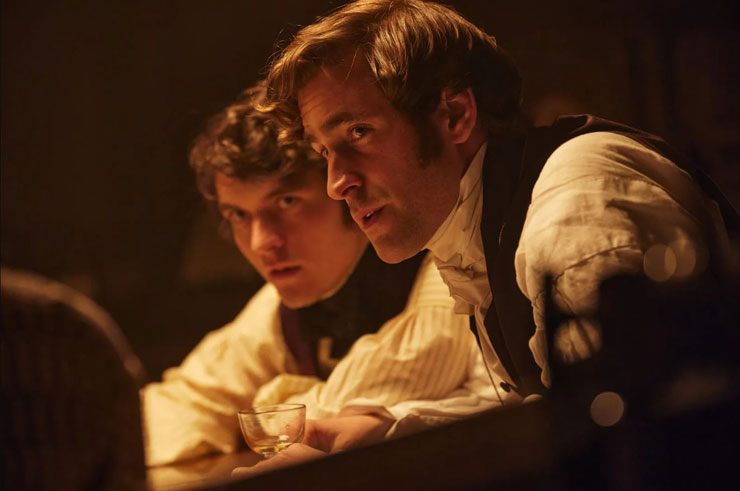
Fionn Whitehead and Oliver Jackson-Cohen in a scene from "Emily." (Photo courtesy of Bleecker Street)
What kicks the story into gear is the arrival of Mr. William Weightman (cutie patootie Oliver Jackson-Cohen, giving off Jake Gyllenhaal vibes), who has come to far-flung Haworth to help lead the flock at Patrick's church as an assistant curate. The new arrival catches the eye of the women in the congregation, with his lyrical turn of phrase on the pulpit and boyishly handsome looks. Stubbornly digging in her heels, Emily sneers at the strapping clergyman's genuinely held faith. But there's something underneath the starchy shirts and stern demeanor that draws the budding author to this wholesome, if rigid, man of the cloth. A lust for life that mirrors her own? Nah, it couldn't possibly be true.
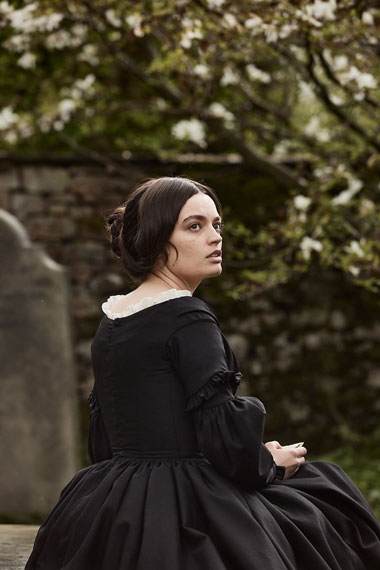
Emma Mackey in a scene from "Emily." (Photo courtesy of Bleecker Street)
The push-pull dynamic of Emily and William's oil-and-water clashes is the spark that drives “Emily” forward. What sets the film apart from your run-of-the-mill “Masterpiece Theater” production period is the way that O'Connor intertwines the writer's romantic life with the creative process that yields her first poems. It's tea-and-crumpets fare, but “Emily” is very much a popcorn movie. Its crossover appeal is undeniable.
O'Connor is certainly no stranger to costume dramas. You might remember her as Fanny Price in Patricia Rozema's splendid 1999 adaptation of Jane Austen's “Mansfield Park” opposite Jonny Lee Miller and Alessandro Nivola. (Steven Spielberg fans will no doubt also recognize her from “A.I.”) It's no surprise that she whips up “Emily's” uniformly strong cast into shape. What is perhaps less expected is that she's also a natural born storyteller. Her visual style is earthy and fluid; it feels guided by Emily's own instincts.
In keeping with her unfussy and straightforward approach to this literary figure, O'Connor refuses to let the film be stifled by the repressed urges on display. For instance, there's an unassuming attention to period detail in Steve Summersgill's production design and Oscar winner Michael O'Connor's costumes. A florid music score by Abel Korzeniowski (“A Single Man”) does call attention to itself, but it maps out the film's emotional territory so vividly that it's difficult to take issue.
Admittedly, O'Connor probably shouldn't have played so fast and loose with the timeline of events, especially where it pertains to Charlotte's own literary aspirations. She also shouldn't have leaned so hard into the speculative, essentially fabricated bond that brings Emily and William closer together. But when the payoff bears a striking resemblance to the climax of Clint Eastwood's “The Bridges of Madison County,” you'd have to be a real sourpuss to remain unmoved. Also, boss move to be borrowing visual cues from the right sources.
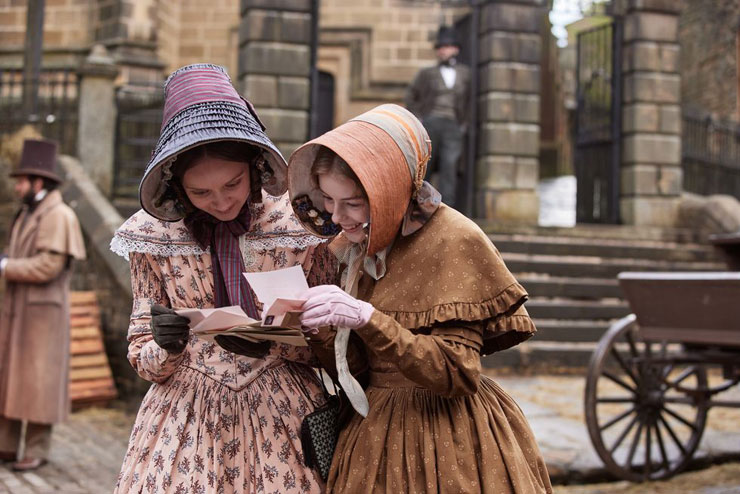
Alexandra Dowling and Amelia Gething in a scene from "Emily." (Photo courtesy of Bleecker Street)
Tragedy was a frequent visitor to the Brontës, something that O'Connor acknowledges, particularly in how it deals with the void left behind by the passing of the family matriarch, Maria Branwell. But for such a brooding foray into inner turmoil and disillusionment, “Emily” is noticeably light on its feet. It clocks in at just over two hours, yet it glides by at a steady clip.
With its charismatic stars, its subject's name recognition and just damn good moviemaking, it's a shame the film is flying under the radar and being given a theatrical release so muted that it feels like a contractual obligation. It doesn't deserve to fall through the cracks. The biggest compliment that I can pay is that it elicits curiosity about the author's work.
O'Connor has crafted a film that's very much about incessant rainstorms, internal and external, but it's also about that time when the clouds clear and life attains a harmony that is all the better appreciated because of all the strife that has preceded it.
“Emily” is now showing through this coming Thursday at Regal Cinemas South Beach and the Silverspot Cinema in downtown Miami.




